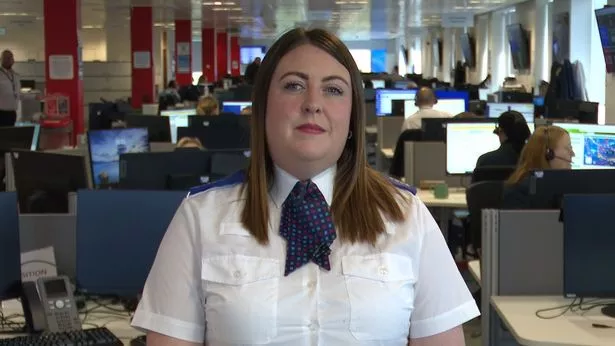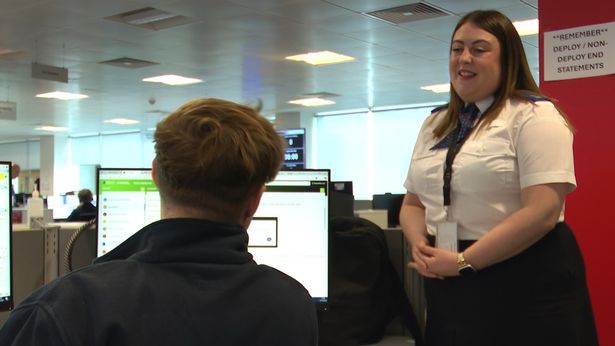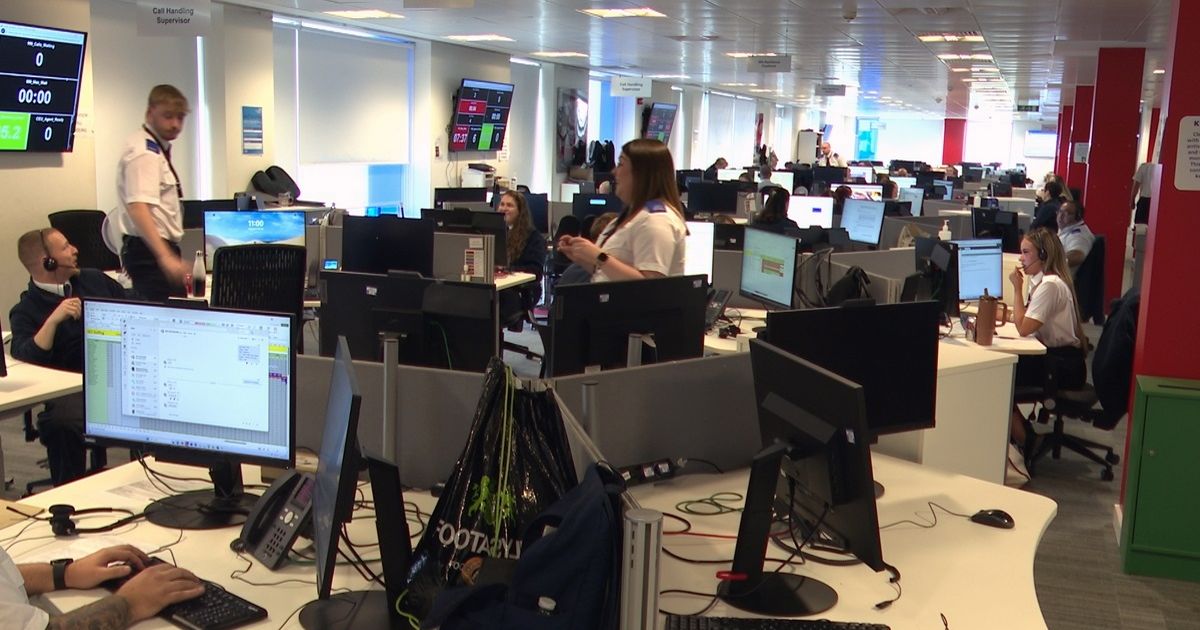We spent an afternoon at Greater Manchester Police control centre Inside the control room at GMP HQ(Image: GMP)
Inside the control room at GMP HQ(Image: GMP)
The 999 call comes in at 3.11pm.
The woman on the end of the line says she’s ringing from a Job Centre in Manchester.
“We have a lady in the reception,” she says. “She’s shouting and screaming when people are coming in. She’s banging on the counter. We’ve had to close the job centre.
“She’s saying she’s going to smash the place up… I’m worried she’s going to hurt herself.”
‘Has she got any weapons?” asks Sam, the call handler sat in the control room at GMP headquarters in Newton Heath. “I don’t think so,” the woman replies. “I haven’t seen any.”
Never miss a story with the MEN’s daily Catch Up newsletter – get it in your inbox by signing up here
Having established the initial details, Sam calmly and methodically begins formulating how the police will respond. He double checks the exact location of the incident, entering it into the computer system as he does so.
He then takes the name, address and description of the woman causing the commotion and asks if she’s thought to have been drinking or taking drugs. When that’s all done Sam grades the incident as ‘high’ risk.
It means police are on their way almost immediately. “We should be there shortly,” Sam tells the caller. “We’re on blue lights.”
And with that he hangs up. The call lasts less than five minutes. And it’s just one of around 40 he will take during an average 10 hour shift.
At any one time around 100 call handlers and dispatch officers are manning the control room. The ‘headset heroes’ as they’re known, are often a member of the public’s first point of contact with the police during an emergency.
And their response can be the difference between life and death.
 Rebecca Greaney, GMP’s head of contact management(Image: GMP)
Rebecca Greaney, GMP’s head of contact management(Image: GMP)
“It’s a unique environment,” says Rebecca Greaney, GMP’s head of contact management. “It’s very pressurised, it’s very fast-paced.
“Don’t get me wrong, it’s very supportive. If they need time they absolutely get it, but a call handler could get a job, it might be distressing, it might be someone in crisis, it might be harrowing, then they have to take the next call and move on.”
In the last 12 months, the control room answered 586,000 999 calls – an average of more than one a minute. On average GMP cops get to an emergency incident in 7 minutes 51 seconds.
That’s a big improvement on the 10 minutes 48 second average response back in 2021, when the then ailing force was in special measures. And it’s not just 999 calls they deal with.
The handlers also field more than 700,000 non-emergency requests every year as well. They’re the calls to the 101 number reporting things like a stolen car or anti-social behaviour, or the members of public who get in touch through the live chat function on the GMP website.
That can be a crucial method of communication if, for example, a victim of a domestic abuse is still in the company of the person who attacked them and is unable to speak.
Back on the floor of the control room it’s surprisingly quiet, despite the constant stream of calls. Call handlers in headsets sit in front of two of large computer screens.
 In the last 12 months, the control room answered 586,000 999 calls – an average of more than one a minute(Image: GMP)
In the last 12 months, the control room answered 586,000 999 calls – an average of more than one a minute(Image: GMP)
On the walls around the room wide screen TVs display real-time graphics updating the number of calls and response times. One shows a bar chart with a running tally of ongoing ‘critical’ incidents. On the Wednesday afternoon we visit it’s showing 109 jobs, with around half in Manchester and Salford.
In her office, just off the main control room floor, Rebecca Greaney, who started out as a call handler 14 years ago, before working her way up to the top job, is remembering one of the most difficult calls she took. It came from a terrified girl who was hidden under her bed.
In whispers she told Rebecca that her family were about to take her away to force her into an arranged marriage.
“We got to her in time,” Rebecca says, still visibly moved by the memory. “Yeah, thank God, for that.”
It’s a striking example of just how critical the job can be. So what makes a good call handler?
Join our Court and Crime WhatsApp group HERE
“Compassion,” says Rebecca. “It can be fairly relentless, so they need to be assertive and controlled to get the information. They need to be resilient. And they need to have a passion a public service.
“If you don’t feel that then I don’t think this is the environment for you.”
But despite the pressures, it can also be an immensely rewarding job.
“The best thing is when you know you have made a difference,” adds Rebecca. “They call call handlers ‘headset heroes. It’s a bit cheesy, but it’s true.”
